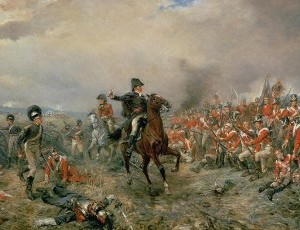Imagine you're standing in a wet, grassy field on a small hill. From this hill, you look over a large camp. There is smoke from the campfires, or is it from the artillery? Soldiers are mustering themselves under the blue, white and red banners.
26,000 of them will be dead by dusk.
June 18 marks the 200th anniversary of the Battle of Waterloo. Napoleon Bonaparte’s loss was the decisive end to the Napoleonic Wars and his reign in Europe.
The battle only lasted one day but determined European destiny for the next century. It was fought by a coalition of six nations lead by Arthur Wellesley, the Duke of Wellington and the Prussian commander, Gebhard von Blücher against Napoleon and his army. The fateful moments of the era have been plumbed for literary inspiration since.
The Napoleonic Era is a bounty for authors from Patrick O'Brian's Naval Aubrey/Maturin series, to the opening events of the classic The Count of Monte Cristo by Alexander Dumas. Check out some of these resources and creative additions to the canon.
Fiction
Waterloo: Relive this fateful day from the microscopic view of one man, Richard Sharpe, as he struggles to convince other leaders to join the British cause against Napoleon.
The Sage of Waterloo: It's not always about the soldiers and commanders. In this novel, rabbits living under the hill where the battle took place examine the legacy of their rabbit ancestors.
Sharpe's Waterloo: The movie version where Sean Bean actually survives.
His Majesty's Dragon: Napoleonic War takes to the skies on the back of mighty dragons.
Nonfiction
Check out our online resource Modern World History Online for a good video about Napoleon.
Waterloo: Bernard Cornwell's skill at depicting the tumult of battle with words shines in this account of the day.
Waterloo: Explore the aftermath of defeat, including a fatalistic Napoleon, and the effects of modern war on the soldiers who died.
The Face of Battle: This downloadable audiobook, from the point of view of a man on the field, shows what it takes to keep fighting in the midst of certain injury and death.
How to Lose A War: Napoleon's arrogance is explored among many other famous losers in this collection.




Add a comment to: The Literary Legacy of Waterloo